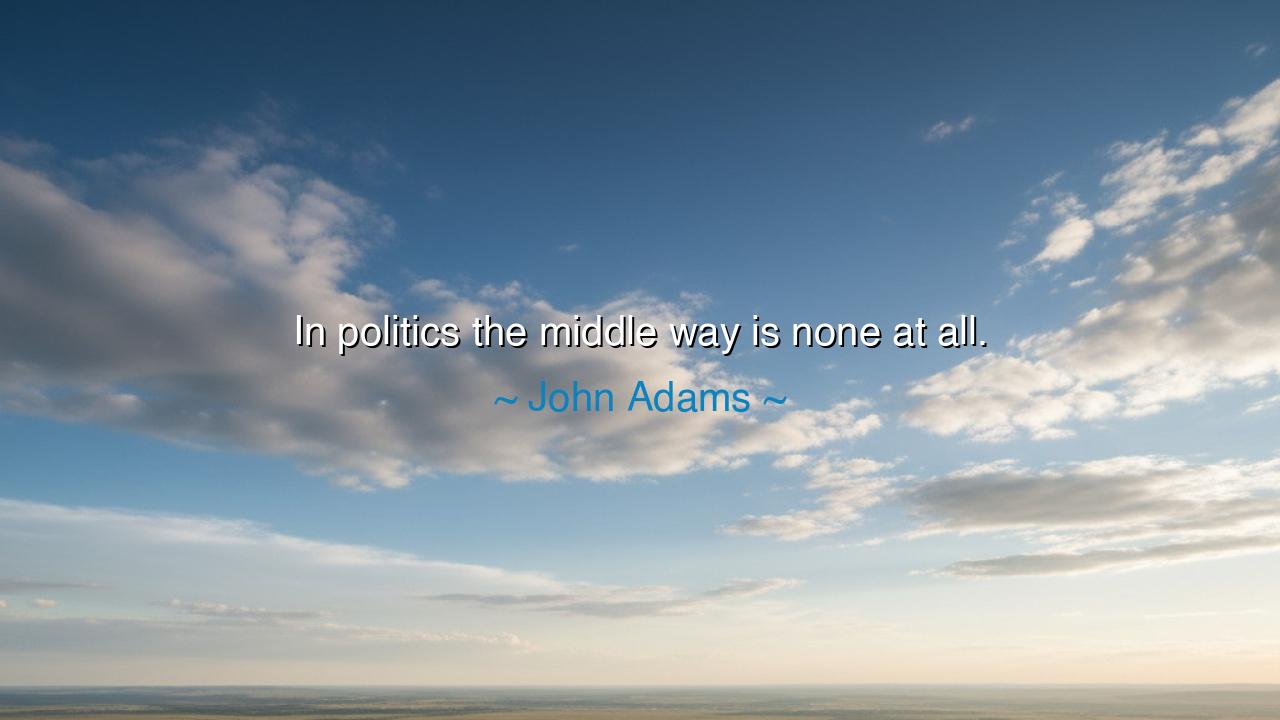
In politics the middle way is none at all.






The words of John Adams — “In politics the middle way is none at all.” — strike like a stern command from the lips of a statesman who had walked through fire. Adams, second President of the United States and a father of the republic, knew that in moments of great trial, hesitation and half-measures were more dangerous than open opposition. To take the middle way in times demanding decision is not to preserve balance, but to embrace paralysis.
The meaning is sharp: in the realm of politics, neutrality is often no virtue. When the fate of nations is at stake, when liberty or tyranny stand in the balance, the refusal to choose is itself a choice — and often a fatal one. To cling to the middle way is to refuse the burden of courage, hiding behind indecision while the world demands resolve. Adams reminds us that progress and justice are not born from compromise with injustice, but from the boldness to stand wholly for what is right.
History itself bears witness. In the years before the American Revolution, many urged reconciliation with Britain, seeking safety in moderation. Yet Adams and his fellow patriots saw that the time for half-steps had passed. To seek the middle way between liberty and submission was, in truth, to choose submission. Thus, in 1776, they cast aside moderation and declared independence, risking all. Their courage proved Adams’ wisdom: only by rejecting the middle way could a nation be born.
This lesson is not confined to his age. Across centuries, whenever oppression rises, there are always voices calling for patience, delay, or compromise. Yet history teaches that the chains of the oppressed are not broken by moderation. The middle way may seem safe, but it prolongs suffering and empowers tyranny. To stand firmly, even at great cost, is the only path that leads to justice and freedom.
Let this wisdom be carried to generations yet unborn: in times of crisis, beware the false comfort of the middle way. For in politics, as in life, there are moments when compromise is cowardice and delay is betrayal. Adams’ words, born from the struggle of revolution, echo as a timeless warning: choose with courage, act with resolve, for the destiny of peoples is written not by those who waver, but by those who dare.






D011- Tien Dung 034
John Adams’ view suggests that the middle ground in politics leads to paralysis. But is that always the case? Is the push for compromise and moderation, which often characterizes centrist politics, really ineffective, or does it simply reflect the challenges of making everyone happy in a polarized system? Can we achieve meaningful change without leaning toward extremes, or does that require a more aggressive approach?
Llink
This quote gives the impression that being in the middle, politically, leads to inaction or indecisiveness. But could this be a critique of today's political climate where extreme voices dominate the discourse? In such an environment, can moderation or compromise still play a role in achieving lasting solutions, or do we need to be more radical to address the complex issues of today’s world?
LDpham ngoc linh dang
Adams’ perspective feels somewhat harsh, but there’s truth in it. Politics often seems to force people into extremes, leaving little room for compromise. But is there a middle ground that works in practice, or do we risk getting stuck in indecision? Can we have a productive political system that embraces moderation, or does such an approach inevitably water down policies to the point of ineffectiveness?
KPTrung kien Pham
This quote makes me think about the nature of political decision-making. If there’s no middle way in politics, does this mean that only extreme positions can bring about change? Can the pursuit of radical solutions ever truly represent the public’s best interests, or does it push people further apart? How can we balance strong convictions with the need for compromise to avoid polarization in politics?
KADo Ha Kieu Anh
Adams’ statement challenges the idea of a centrist or balanced approach in politics. Does this imply that political compromise is inherently ineffective, or is he criticizing the lack of strong convictions in the middle ground? Is the middle way in politics really futile, or can it serve as a necessary path for finding common ground? How do we reconcile this view with the idea that cooperation between opposing parties is essential for progress?